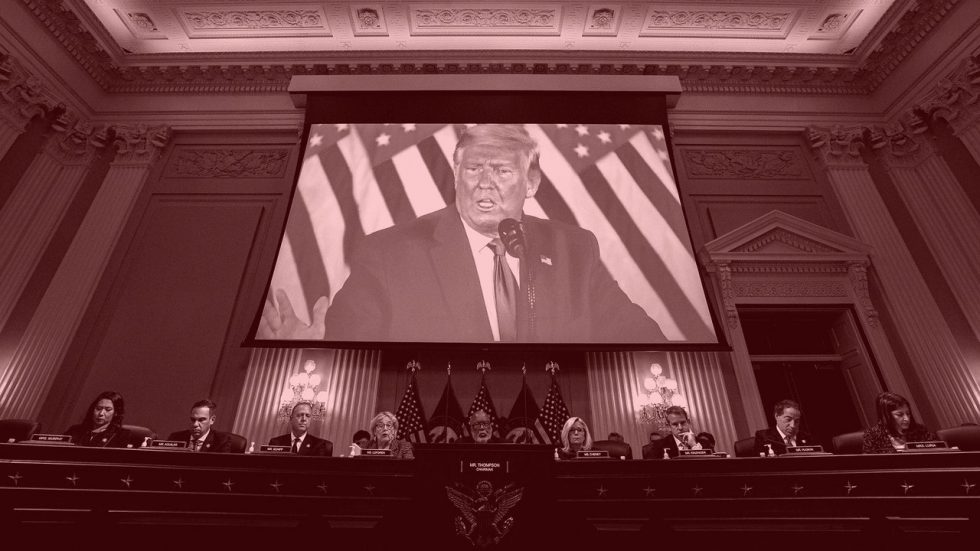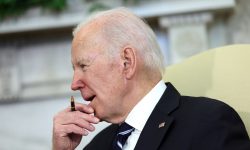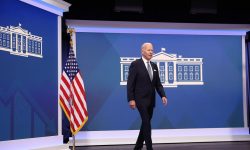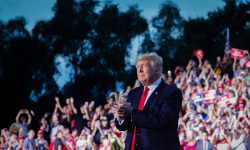
The January 6 committee did not hold back in its struggle to make Donald Trump and his allies answer for the violent riot they instigated in January 2021. But the panel may have pulled at least one punch: As the Washington Post reported Tuesday, the congressional investigators compiled significant evidence of content moderation failures by social media companies in the lead-up to the insurrection, but did not include much of it in their final report. Instead, the committee reportedly kept the 400-plus page chronicle of the Capitol attack focused on the former president, evidently in the interest of avoiding a show-down with Big Tech.
“Given the amount of material they actually ultimately got from the big social media companies, I think it is unfortunate that we didn’t get a better picture of how ‘Stop the Steal’ was organized online, how the materials spread,” Heidi Beirich, co-founder of the Global Project Against Hate and Extremism, told the Post. “They could have done that.”
Per the Post, the House committee—which wrapped its inquiry last month, before Republicans assumed their narrow majority in the lower chamber—gathered material detailing how tech companies allowed extremism and conspiracy theories to spread on their platforms ahead of the January 6 attack, and ignored warnings from their own employees about the uptick in violent rhetoric during the lead-up to January 6. Platforms were “exploited in tandem by right-wing activists to bring American democracy to the brink of ruin,” a 122-page committee memo warned. Included among the investigators’ findings was evidence that Twitter may have given Trump preferential treatment, undercutting claims Elon Musk has amplified in Matt Taibbi’s so-called “Twitter files” series about alleged anti-conservative bias behind-the-scenes of the platform: “Twitter was terrified of the backlash they would get if they followed their own rules and applied them to Donald Trump,” a former staffer testified.
But the committee left much of the findings from the memo out of their final report. It’s not clear why the panel ultimately elected not to delve deeper into social media failures, but sources familiar with the matter suggested members were concerned that making social media greater focus of the report risked engaging the powerful companies in a protracted public fight. It was reported in November that former ranking member Liz Cheney, who was one of two Republicans on the committee, had been a driving force behind the committee’s narrower focus on Trump. But the Post reported on Tuesday that Democrat Zoe Lofgren, whose California district includes Silicon Valley, had also been reticent to make tech companies a bigger focus—a claim the representative denied to to the Post. “I spent substantial time editing the proposed report so it was directly cited to our evidence, instead of news articles and opinion pieces,” Lofgren told the Post. “In the end, the social media findings were included into other parts of the report and appendixes, a decision made by [Chairman Bennie Thompson] in consultation with the Committee.”
The January 6 committee still did a remarkable job of examining Trump’s unprecedented attack on democracy through its investigation, public hearings, and final report, making a case both to the American public and to the Justice Department that the former president must be held accountable. The panel’s legacy should be that it “told the truth at a time when truth was on the line,” as retired Congressman Adam Kinzinger, the committee’s other Republican member, told me last week. But its limited exploration of social media failures could be a missed opportunity to similarly urge accountability for these powerful platforms, which remain just as—or perhaps even more—primed for exploitation by extremists as they were before. “Nothing about about America’s stormy political climate or the role of social media within it,” as investigators cautioned in their memo, “has fundamentally changed since January 6th.”





